
GEOLOGICAL QUARTERLY
Scope & Guideline
Connecting Minds in Earth Sciences Since 2000.
Introduction
Aims and Scopes
- Paleoenvironmental Studies:
Research focusing on reconstructing past environments through geological and paleontological evidence, including sedimentology and biostratigraphy. - Geochemical and Mineralogical Analyses:
Studies aimed at understanding the composition, formation, and alteration of minerals, often utilizing advanced techniques such as isotopic analysis and geochemical modeling. - Stratigraphic Investigations:
Research dedicated to the analysis of stratigraphic sequences to elucidate geological history and basin development, often involving detailed sedimentological and paleontological assessments. - Tectonics and Structural Geology:
Explorations of tectonic processes and the structural evolution of geological formations, often integrating geophysical techniques and field studies. - Environmental Geology:
Studies assessing the interactions between geological processes and environmental factors, including contamination assessments and resource management. - Geological Hazards and Risk Assessment:
Research focused on understanding and mitigating the impacts of geological hazards, such as landslides, earthquakes, and subsidence.
Trending and Emerging
- Application of Artificial Intelligence in Geology:
The utilization of AI and machine learning techniques for predictive modeling and data analysis is on the rise, reflecting a broader trend towards integrating technology in geological research. - Climate Change Impacts on Geological Processes:
There is an increasing focus on understanding how climate change influences geological processes, sedimentation patterns, and the stability of geological formations. - Sustainable Resource Management and Environmental Remediation:
Research that intersects geology with environmental science, particularly in the context of sustainable mining practices and remediation of contaminated sites, is gaining prominence. - Geophysical Methods in Geological Studies:
The use of advanced geophysical techniques, such as electrical resistivity tomography and ground-penetrating radar, is emerging as a significant trend for subsurface investigations. - Paleobiology and Evolutionary Geology:
A growing interest in the evolutionary aspects of geology, including the study of fossil records and their implications for understanding past environmental conditions.
Declining or Waning
- Traditional Mineral Exploration:
Research focused solely on mineral exploration without integrating modern techniques or environmental considerations is becoming less prominent as the field advances towards more holistic approaches. - Static Geological Modelling:
Publications centered on purely static models of geological formations are decreasing, as the field shifts towards dynamic modeling that incorporates temporal changes and real-time data. - Regional Geological Surveys without Interdisciplinary Links:
Studies that limit themselves to regional surveys without interdisciplinary approaches, such as integrating geophysics or environmental science, are witnessing a reduction in interest.
Similar Journals
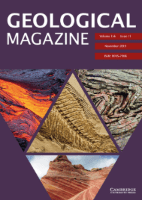
GEOLOGICAL MAGAZINE
Pioneering Discoveries in Earth and Planetary SciencesGEOLOGICAL MAGAZINE, published by Cambridge University Press, is a premier journal in the field of geology, renowned for its rich legacy since 1864 and ongoing contributions to Earth and Planetary Sciences. With an impressive Q1 ranking in Geology and a Scopus rank of #70 out of 321 journals, it holds a significant position within the academic community, appealing to researchers, professionals, and students alike. The journal covers a wide array of topics, ensuring a comprehensive platform for the dissemination of cutting-edge geological research. Although it does not offer open access, it remains a vital resource for those seeking to stay abreast of advancements in the field. With an enduring commitment to quality, GEOLOGICAL MAGAZINE stands as an essential outlet for scholarly communication and serves as a catalyst for academic discourse within the geological sciences.

Frontiers of Earth Science
Pioneering Research for a Sustainable FutureFrontiers of Earth Science is a prominent academic journal in the field of Earth and Planetary Sciences, published by Springer. With an ISSN of 2095-0195 and an E-ISSN of 2095-0209, this journal serves as a significant platform for researchers and professionals to disseminate their findings from 2007 to 2024. It is recognized for its impactful contributions within the category of Earth and Planetary Sciences, boasting a respected Q2 ranking in 2023. With a Scopus ranking of 64 out of 195, placing it in the 67th percentile, Frontiers of Earth Science continues to drive academic dialogue and innovation. The journal is dedicated to exploring a diverse range of topics, including geology, meteorology, and environmental science, and amplifying the understanding of Earth systems through rigorous research. Located in New York, USA, this journal embraces an Open Access model, ensuring that groundbreaking research is readily available to the global scientific community, thereby enhancing its accessibility and impact.
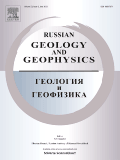
Russian Geology and Geophysics
Exploring the Depths of Geology and GeophysicsRussian Geology and Geophysics is a seminal journal published by GEOSCIENCEWORLD that plays a pivotal role in the dissemination of vital research within the realms of Earth-Surface Processes, Geology, and Geophysics. With an ISSN of 1068-7971 and an E-ISSN of 1878-030X, this journal has witnessed a continuous evolution since its convergence in 2007 and is poised to thrive through 2024. While it is not an Open Access journal, it is recognized for its significant contributions to the academic community, holding a respectable Q2 ranking in Earth-Surface Processes and Q3 rankings in both Geology and Geophysics as of 2023. The journal’s impact factors align it within competitive quartiles, marking it as an essential resource for researchers and professionals seeking to stay at the forefront of geological and geophysical sciences. By publishing high-quality peer-reviewed articles, the journal fosters an environment of knowledge sharing and innovation, making it indispensable for students, practitioners, and scholars alike who are dedicated to advancing our understanding of Earth's complex systems.
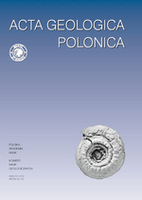
ACTA GEOLOGICA POLONICA
Elevating Earth sciences through distinguished scholarship.ACTA GEOLOGICA POLONICA is a distinguished journal published by the Polska Akademia Nauk, in collaboration with the University of Warsaw's Geology Department. Since its inception, it has served as a vital platform for disseminating innovative research in the field of Geology, reflecting a commitment to advancing scientific knowledge in Earth and planetary sciences. With an ISSN of 0001-5709 and an E-ISSN of 2300-1887, this journal provides a rigorous review process and is classified in the Q3 quartile for Geology as of 2023, indicating its growing influence in the discipline. Despite not being open access, the journal facilitates meaningful contributions that span a range of geological topics from fundamental research to applied sciences, thereby enriching the academic landscape. Researchers, professionals, and students alike are encouraged to engage with the valuable findings and discussions contained within its pages, which continue to shape the future of geological inquiry.
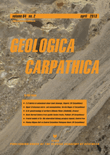
GEOLOGICA CARPATHICA
Exploring the Depths of Earth SciencesGEOLOGICA CARPATHICA, with ISSN 1335-0552 and E-ISSN 1336-8052, is a distinguished open access journal published by the Slovak Academy of Sciences Geological Institute, serving as a pivotal platform for the dissemination of research in the field of Geology. Established in 1991 and continuing through 2024, the journal is recognized for its significant contributions to Earth and Planetary Sciences, evidenced by its 2023 Scopus ranking placing it in the second quartile (Q2) within Geology. With an H-index that showcases its impactful publications, GEOLOGICA CARPATHICA is committed to fostering scholarly communication while promoting accessible research, having adopted an open access model since 2009. Located in beautiful Bratislava, Slovakia, this journal aims to engage a global audience of researchers, professionals, and students interested in ecological, geological, and environmental studies, making it a prominent resource for enriching the scientific community's understanding of the Carpathian region and beyond.
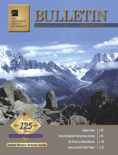
GEOLOGICAL SOCIETY OF AMERICA BULLETIN
Innovative Research Shaping the Geosciences LandscapeThe Geological Society of America Bulletin (GSA Bulletin), with ISSN 0016-7606 and E-ISSN 1943-2674, is a premier scholarly journal published by Geological Society of America, Inc. Based in the United States, this journal has been a cornerstone of geological research since its inception in 1890, making significant contributions to the understanding of Earth sciences over more than a century. Recognized for its rigorous peer-review process, the GSA Bulletin currently holds a prestigious Q1 ranking in Geology, positioning it among the top 14 journals in Earth and Planetary Sciences in terms of Scopus ranking, reflecting the high quality and impact of the research it publishes. Researchers, professionals, and students alike benefit from its comprehensive coverage of geological topics, including sedimentology, volcanology, and paleontology, which supports the advancement of knowledge in the geosciences. While the journal is not open access, it continues to provide a vital platform for innovative research and critical discussions that shape the future of geology.
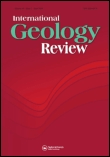
INTERNATIONAL GEOLOGY REVIEW
Fostering a deeper understanding of Earth's processes and materials.INTERNATIONAL GEOLOGY REVIEW, published by Taylor & Francis Inc, is a premier journal dedicated to advancing the field of geology since its inception in 1959. With its Q1 ranking in the field of Geology for 2023, this journal is a significant platform for researchers, professionals, and students exploring the intricacies of Earth and planetary sciences. The journal has been rated in the 81st percentile within Scopus rankings, reflecting its influence and the high quality of articles published. Although it does not offer Open Access options, the journal maintains a rigorous peer-review process to ensure the publication of original and impactful research. With an extensive archive projected to continue until 2024, INTERNATIONAL GEOLOGY REVIEW serves as an essential resource for those seeking to deepen their understanding of geological phenomena, making it a vital contributor to the global scientific community.
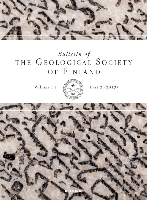
BULLETIN OF THE GEOLOGICAL SOCIETY OF FINLAND
Advancing geological knowledge since 1968.BULLETIN OF THE GEOLOGICAL SOCIETY OF FINLAND, a distinguished publication in the field of Geology, has been at the forefront of scientific discourse since its inception. Published by the Geological Society of Finland, this journal offers an Open Access platform for researchers since 1968, ensuring that high-quality geological research is widely accessible. With an ISSN of 0367-5211 and E-ISSN 1799-4632, the journal aims to disseminate significant findings in Earth and planetary sciences, contributing to a richer understanding of geological phenomena. Situated in Finland and headquartered at the Finnish Museum of Natural History, University of Helsinki, it serves as a pivotal resource for professionals, students, and researchers, maintaining a respectable Q3 category rank in Geology as of 2023 within Scopus' metrics. The journal is committed to fostering the advancement of geology through rigorous peer-reviewed articles, innovative research methodologies, and interdisciplinary approaches, helping to bridge gaps in knowledge while inspiring new generations of geoscientists.
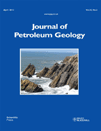
JOURNAL OF PETROLEUM GEOLOGY
Innovating the Future of Petroleum ResearchJOURNAL OF PETROLEUM GEOLOGY, published by WILEY, is a prestigious peer-reviewed journal that serves as a vital platform for advancing knowledge in the fields of Earth and Planetary Sciences, Energy Engineering, and Geology. Established in 1978, this journal has cultivated a significant impact, reflected in its 2023 Q2 category rankings across multiple disciplines including Fuel Technology and Geology. Notably, it holds a commendable position in Scopus rankings, marking its importance with a 68th percentile in Earth and Planetary Sciences - Geology. While the journal operates under a traditional subscription model, its extensive repository of research articles facilitates crucial discussions and innovations among researchers, professionals, and students alike. The JOURNAL OF PETROLEUM GEOLOGY is pivotal for those seeking to explore and contribute to the evolving landscape of petroleum geology, offering insights that are essential for both academic and applied science domains.

LITHOLOGY AND MINERAL RESOURCES
Illuminating the Path from Lithology to Resource StewardshipLITHOLOGY AND MINERAL RESOURCES, published by PLEIADES PUBLISHING INC, is a specialized journal dedicated to advancing knowledge in the fields of economic geology, geochemistry, and petrology. With its ISSN 0024-4902 and E-ISSN 1608-3229, this journal has established itself as a critical resource for scholars and practitioners alike, examining the intricate relationships between lithology and mineral deposits, and their implications for resource management. As indicated by its positioning in the Q3 quartile for both economic geology and geochemistry and petrology in 2023, the journal is recognized for its valuable contributions to the scientific community, ranking #28 out of 43 in Economic Geology and #112 out of 154 in Geochemistry and Petrology according to Scopus. The journal's publication history reveals a rich tradition of excellence, as it has been continuously contributing to the field from 1984 to 2024. While it does not offer open access options, researchers and practitioners can easily engage with its robust body of work in effective ways to support their own studies and applications. The importance of LITHOLOGY AND MINERAL RESOURCES lies in its commitment to publishing high-quality research that informs practices in mineral exploration and environmental stewardship, making it an essential resource for anyone invested in the future of earth sciences.